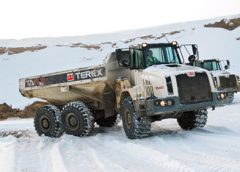By Mark S. Kuhar
Winter is the time of the year when the relationship between man and machine is put to the ultimate test. From frostbite to fatigue failures, operating in extremely low temperatures where downtime is not an option is always a challenge. Terex Trucks’ Regional Customer Support Manager John Hunter offers some key practices to aid safe operation, and prevent damage to off-highway haulers in the cutting cold. He knows from experience, as a veteran of temperatures of -30 degrees during winter in Siberia, Russia.
Reduce Risks
To avoid machine downtime or expensive repairs in the future, operators must not neglect air filtration, fuel and lubrication, Hunter explained. “It’s important to drain sediment in the fuel daily as it’s one of the greatest causes of fuel injection system failures. In addition to cleaning the fuel tank and making sure it’s functioning correctly, the tanks must be full to reduce moisture condensation. It’s also good practice to keep a spare filter handy.”
As diesel fuel is prone to gelling or waxing in cold weather, Hunter also recommends only using arctic oils that meet API specifications, fuel with the maximum cloud and points of 6 C or 10 F, and winter protection kits that make idling a thing of the past.
Keep Cool and Charged
Hunter also recommends that cooling systems should be inspected weekly, in particular, the coolant reservoir and hoses. Throughout winter, a close eye should be kept on the coolant as it does so much more than simply stop the cooling system from freezing – it also increases the boiling point temperature, confines cavitation, averts corrosion and lubricates shaft seals.
“Make sure that the cooling system is adequately protected from the climatic conditions and that coolant in the radiator is filled to the cap,” Hunter said. “Also, in extreme climates, the ratio of ethylene glycol antifreeze to water should be 60 to 40, to eliminate the possibility of the water freezing and creating stress in the engine.”
It is essential to make sure batteries are properly charged throughout winter if machines are to be put to work, as attempting to charge a frozen battery will often cause the battery to explode. This is why maintenance of the battery should begin in autumn, operators must ensure the electrolyte is topped up to the indicated level and flowing over the plates. Another key step to facilitate consistent current supply from the batteries to the machine is by cleaning any debris and rust from the top of the battery.
If planning to store trucks away for the winter season, Hunter advises: “In very cold or hot climates, store the batteries where they will be protected from temperature extremes. Coat the battery terminals and cable ends with acid resistant petroleum jelly.”
Treading a Fine Line
Throughout winter the inflation pressure of tires should be checked at least once every two weeks. To minimize wear, remove debris, grease or oil from the tires and regularly inspect for any cracking and chunking. “When extended storage is anticipated, trucks should be blocked up so that weight does not rest entirely on the tires.,” Hunter said. “Ideally it’s better if machines are stored under cover; otherwise, tires need to be protected from the elements by an opaque waterproof covering.”
Finally, as well as protecting the machine from the elements, operators must also be adequately prepared to work in extreme conditions. No stranger to the big chill himself, Hunter said: “Wear as many layers of clothing as possible, which allow for comfortable movement. One thick layer of clothing is not as effective in insulating the body against the cold the way several layers can. It’s important to protect your head, ears, nose, hands and feet. More than 40 percent of body heat can be lost from the head if left uncovered, hence why wearing warm hats with ear covers is crucial when working in the cold. Likewise, it’s important to be aware of the medical conditions, which can result from cold weather exposure, such as cold stress, for example, frostbite and hypothermia.”
Operators can also keep the cold out with frequent drinks of warm liquids such as decaffeinated coffee, tea, hot chocolate or broth. “Avoid caffeine when working in the cold, as it hinders the body’s heat-producing mechanisms, and causes the body’s core temperature to drop,” Hunter said.

